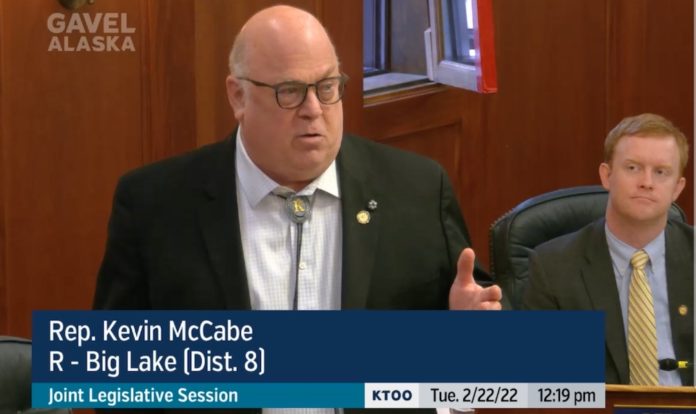By REP. KEVIN MCCABE
One of the most significant issues with the Freedom Index is its inherent lack of objectivity.
The Freedom Index is based on the specific ideological beliefs of the John Birch Society, which prioritizes an interpretation of the Constitution that align with its conservative viewpoints. The criteria used to evaluate lawmakers are heavily influenced by the organization’s and local politicians political agenda rather than a neutral assessment of legislative actions.
The score doesn’t consider whether a bill ultimately becomes law, only how each legislator voted on specific key votes including amendments that do not pass. The particular local votes are cherry-picked by the John Birch Society, or worse, some local politician or political wonk. This raises questions about the credibility of the ratings and whether they provide a fair representation of other non-aligned politician’s overall performance.
Lawmakers who may take moderate or bipartisan approaches could be unjustly penalized if their actions do not align perfectly with John Birch Society’s rigid standards leading to an incomplete and misleading picture of political effectiveness.
While the Freedom Index gives high marks to votes that limit government and cut spending, representatives in the real world must weigh the needs of their unique districts. Sometimes that means supporting policies that benefit their local economies, even if it involves federal spending or a match which is especially true in Alaska. A one-size-fits-all approach doesn’t account for these often necessary regional priorities.
The selective focus of the Freedom Index gives more weight to certain types of issues, such as votes on sovereignty or regulatory actions, while often undervaluing other important areas like veterans’ support, rural development, or community safety initiatives. It missed the bigger picture of what legislators are actually accomplishing for their communities. Governing is not about the vote alone it should be about the community.
And this index can be manipulated. The Alaska bill to re-establish the citizen watchdog group (CACFA) to push back against federal overreach would seem like the ultimate barrier to federal overreach. Yet it wasn’t one of the bills evaluated by John Birch Society for the Alaska Freedom Index. Possibly it wasn’t included because Rep. David Eastman, the only 100% legislator on the Index, voted against it.
Allegedly it was one of Eastman‘s ardent supporters, Kassie Andrews, who submitted the bills used for the scorecard for Alaska legislators – she has publicly stated that she was the one.
She also included old legislation that some of the legislators weren’t around to vote for or against, as well as amendments that did not even pass.
This is typical of the way the Eastman support groups operate. He offers an amendment that does not pass for whatever reason (often just because he offered it) and then his support groups publicly excoriate those who voted against it. This is the biggest flaw in the Freedom Index.
The Index is an oversimplification of intricate policy matters into binary choices. It labels votes as either “freedom” or “anti-freedom.” This reductionist approach fails to capture the nuanced realities of governance, as well as the longer term strategy often involved in good policy making. Many legislative decisions involve complex trade-offs and require balancing competing interests values and priorities, often of two different communities in the same district.
By categorizing votes in such a simplistic manner, the Freedom Index undermines the importance of dialogue, compromise, and the understanding that good governance often involves difficult choices. .
By labeling lawmakers who do not align with its strict criteria as “unfreedom” supporters, the JBS cultivates an environment of distrust and animosity towards political opponents. This encourages even more radical positions among its supporters, pushing them to reject compromise altogether. The index exacerbates political polarization by labeling those that disagree with JBS’s interpretation of freedom as fundamentally un-American or illegitimate which further contributes to a political culture where cooperation is already difficult.
As a lawmaker strives to improve his Freedom Index ratings, he may feel compelled to adhere strictly to the JBS’s criteria, potentially leading to more rigid and uncompromising positions and an entire legislative body refusing to work with him. It creates an environment for him where compromise is viewed with skepticism, as he becomes more focused on his ratings than on being and effective legislator – in the military this is called “combat ineffective”.
Legislators frequently have to work across the aisle to get things done. This index doesn’t account for the value of compromise, even when they reflect well-thought-out policies or practical solutions. By scoring in a way that penalizes cooperation, the index sometimes discourages practical governance in favor of rigid ideology.
Lack of objectivity, oversimplification of complex issues, potential for promoting extremism, and implications for political polarization all suggest that the Freedom Index may do more harm than good. In a representative republic fostering dialogue understanding and collaboration among differing viewpoints is crucial. A rating system that diminishes these values, no matter which side of the political spectrum, ultimately undermines the very principles it seeks to uphold; especially true when it is manipulated by a local political group or politician.
While the Freedom Index is a useful tool for understanding a legislators viewpoint of limited government, it isn’t a complete measure of effectiveness or of the balanced work they do on behalf of their constituents. Not organic at all, it is a derived view, of a legislators body of work often influenced by local politics, or possibly the combat-ineffective politician.
Rep. Kevin McCabe represents District 30, Big Lake and north, and is a commercial airline pilot and military veteran.
